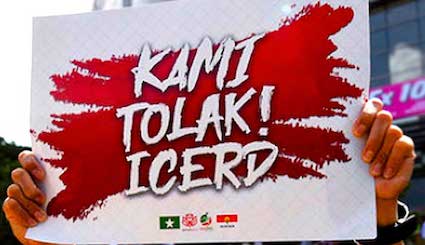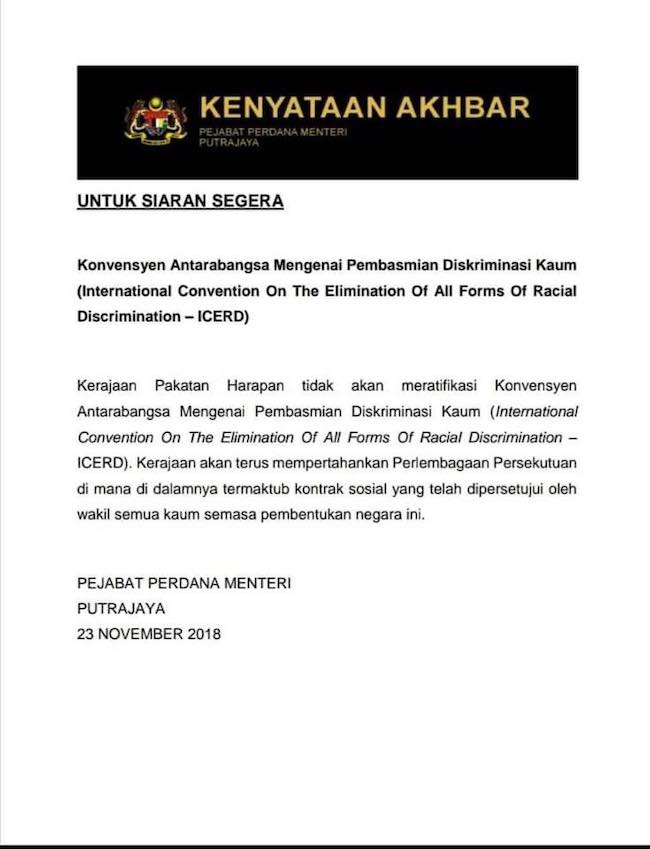U-turn on ICERD – what went wrong?

Khoo Ying Hooi, The Malaysian Insight
YESTERDAY, Putrajaya, in an official statement, said that it will not proceed with the plan to ratify the International Convention on the Elimination of All Forms of Racial Discrimination (ICERD) after intense resistance from Malay rights groups and individuals, as well as political leaders and parties who warned that ratifying ICERD was a threat to Malaysia’s affirmative action policies.
“The government will continue to defend the Federal Constitution, which includes the social contract agreed upon by representatives of all races during the founding of this nation,” read the statement from the Prime Minister’s Office.
The U-turn by Putrajaya is upsetting, particularly for human rights groups, as we move closer international human rights day on December 10. Prime Minister Dr Mahathir Mohamad will make an appearance at a human rights festival organised by the Human Rights Commission of Malaysia (Suhakam) on December 8 in Padang Timor, Petaling Jaya. This is the first time that a human rights festival will take place on a large scale with the prime minister set to attend.
The various issues that have taken place since the historic May 9 general election has taught us some lessons. For the past 61 years, we have hardly had any strong domestic resistance as such on government’s policies related to human rights. We have only ratified three international human rights treaties – on women, children and persons with disabilities – despite pressure from human rights groups, be it local or international, to the government to ratify the remaining six human rights treaties. The sudden decision not to proceed with the ICERD ratification has revealed the weaknesses in the government of the day.
First, there has been significant lack of appropriate or effective communication channel from the government to the people on human rights issues. Take the ICERD for instance; after the announcement by the Foreign Ministry on Malaysia’s commitment to signing and ratifying the remaining six international human rights treaties out of a total of nine in the United Nations (UN), there has been little information on educating people about what these human rights treaties are, how it works and its impact on the people.
The complexity of the multiracial and multireligious environment we live in here in Malaysia is not new, and knowing such issues have the potential to transform into a racial or religious issue, I expected the government to have predicted such resistance from Day 1 of taking over Putrajaya.
I applaud the commitment of the Pakatan Harapan government on its commitment and desire to be a part of all international human rights treaties. However, it is unfortunate that the government has miscalculated the reaction it received. Resistance towards ICERD ratification has been based mainly on misperception and lack of knowledge on the impact and role of these treaties, and the government failed to counter such misinformation. This leads to the second issue, in which it invites speculations of the political will and readiness of the government in the arena of human rights protection.
Third, even after six months, the government has not realised that generally, Malaysians are not exposed to any formal form of human rights education. While the support of the people for PH has managed to lead the alliance to govern the country, there have been many instances that show the serious gap of people’s understanding on what human rights are in practice and in reality. The human rights discourse has undoubtedly increased but instances, such as the resistance to ICERD and abolition of the death penalty, were clear examples that the government has not changed the approach to communicating with the people at large. What is needed is for the government is to unite themselves by using the right language to gain the people’s support in terms of human rights commitments.
The lack of penetration of human rights language into the masses is something that the government needs to put more effort on. Apart from education and public awareness, efforts to popularise human rights language into their daily communication to the people and into government policies might help foster more understanding on what human rights are. In conjunction with this international human rights day, I fervently hope that the government will be able to change the narrative of our strong embedded system that is based on communalism to rights language that could foster a system based on indivisibility and inclusivity. – November 24, 2018.
* Khoo Ying Hooi is a university lecturer and reads The Malaysian Insight.


